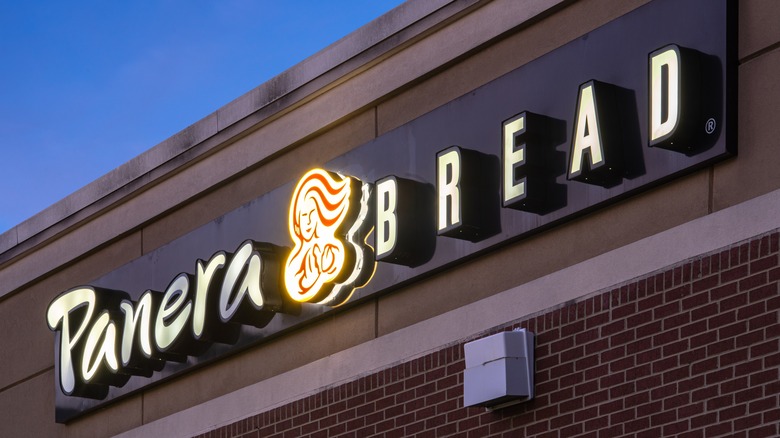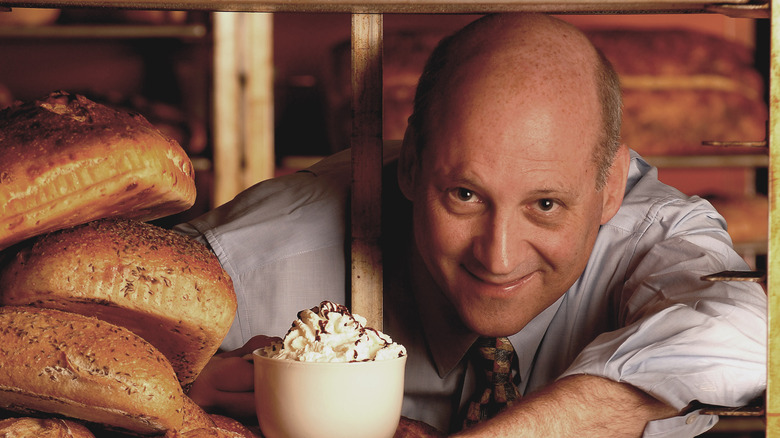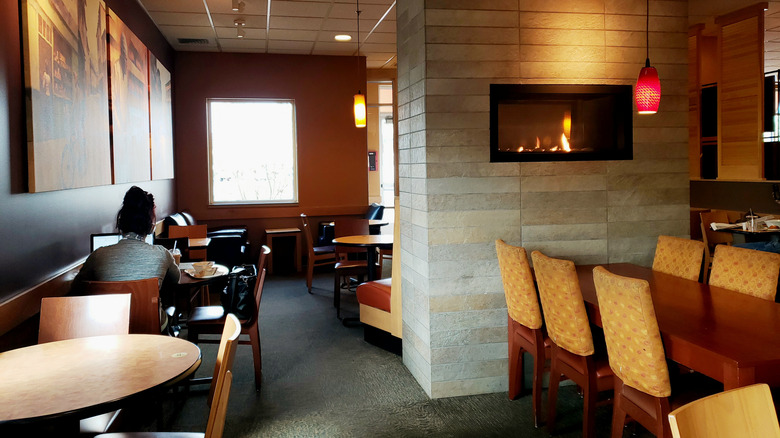Panera Bread's Downfall Is Easily Explained By These Bad Money Moves
Panera Bread built its reputation on freshly-baked bread and free WiFi. For the price of a cinnamon crunch scone and a fountain drink, one could camp out at a Panera Bread for hours as a freelance worker. Families could dine on soup and salad, feeling good for eating cleaner than from a fast food drive-thru. A quick breakfast of fresh-baked pastries could delight an office. While Panera is infamous for once stocking lemonade so caffeinated that it killed people under certain health conditions, NBC News reported, its decline is not solely down to that awful news. In recent years, swiftly rising prices and a stark quality downfall have combined with poor money moves from corporate leadership to put that chain at risk of losing the empire it had built.
Panera Bread has been coasting on positive memories of the past, and along with paying out a massive settlement for a customer data breach, the chain has been tossing away stores as if they were the insides of a bread bowl. As Restaurant Business noted, the downfall of Panera Bread is largely the result of private equity ownership shifting Panera into a fast food restaurant wrapped in fast-casual memories — with no more freshly-baked bread.
An ownership and ethos change
Panera Bread was founded by Ken and Linda Rosenthal as St. Louis Bread Co in Missouri, in 1987. In 1993, Au Bon Pain bought the company under CEO Ron Shaich for $24 million, per a New York Times report. It later changed its name to Panera Bread and sold off Au Bon Pain stores. By the early 2000s, Panera had become a wildly successful chain of cafes that served bread baked in stone ovens and a cozy retreat to all who visited. This was the corporate vision of the store: to provide a haven stocked with artisanal items, welcoming booths, and smooth lighting.
The company rode that vision to the bank, and built up over 2,000 U.S. locations and $2.8 billion in revenue by 2016. It was a pioneer in kiosk ordering, calorie posting, and publicized a "No-No List"in 2015 of ingredients it refused to use. In 2017, Panera Bread announced via outlets including Fortune that its menu was 100% "clean eating." Then, in April 2017, Panera was acquired for a stunning $7.5 billion by JAB Holding Company, which also owns Krispy Kreme.
JAB is based in Germany and owns many famous brands. Panera's shift from being a company focused solely on its customer experience to becoming one of many others almost immediately became apparent, as its restaurants which went from cozy to more stark. This was to be the first sign of major changes to come. JAB initially leaned into to-go ordering for Panera's success, and away from almost everything else for the sake of higher profitability and efficiency, Nation's Restaurant News reported.
Corporate cost-cutting under JAB leadership
JAB-owned Panera Bread cafes were stripped of cozier elements, and signs were posted asking customers to limit their stay. The "No-No List" signage was removed, as not-so-clean ingredients returned to menus. Portion sizes shrank. Customers often posted sad responses to tinier items on social media. The company did rounds of layoffs.
Menu items disappeared in 2024, as dishes with more protein were added, perhaps to combat responses to trimmed portions. The heart of the store was always the bread, baked fresh on-site. Founder Ken Rosenthal's 2025 New York Times obituary even quoted the man as saying: ""Creating sourdough bread, for instance, is a slow, tedious process, and it's difficult for a large commercial bakery to create that type of a product." JAB's Panera Bread will no longer bake its own bread as of 2025, with Nation's Restaurant News reporting the company planned to use "par-baked" breads close all dough facilities.
All pastries have been changed to heat-and-eat frozen pastries, with bakers' hours shortened. This is part of the chain's three-year turnaround plan, started after sales had their first post-COVID-19 decline of 5.1% in 2024. JAB ownership has also invested in Artificial Intelligence to assist with automation, reducing front-of-house staff in favor of kiosk ordering. At this rate, Panera Bread may become known more for its unlimited Sip Club perks or its own $7.5 billion collapse than it will for being a good place to grab a wholesome bite, bread or otherwise.


